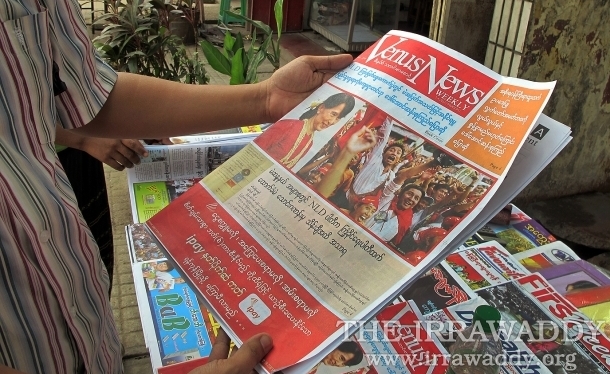The decision of the Burmese government on Monday to abolish the pre-censorship of articles in the national media has received a mixed response. The Irrawaddy examines the consequences of this landmark move.
What did the PSRD say to editors?
The Burmese government told editors of weekly journals on Monday that, effective immediately, their outlets “no longer need to pass the censorship board.” Tint Swe, the head of Burma’s Press Scrutiny and Registration Division (PSRD), added that the easing of restrictions was the result of policy changes within the Ministry of Information.
So time to congratulate journalists in Burma?
Journalists who faced pressure and imprisonment in Burma cautiously welcomed the announcement that they will no longer be required to submit articles to the country’s draconian censorship board. But they are very aware that “Big Brother” is still there to monitor and watch.
The move is not enough to restore media freedom. However, it is safe to say that the government has made a small concession after shutting down local journals and facing pressure and street protest from journalists.
So no more censorship and Burma’s enjoys press freedom?
No, no yet. The government will continue to monitor news and bulletins and the censorship board is still active and has not been abolished. Burma’s 1962 Printers and Publishers Registration Act is still there—the act was imposed shortly after former dictator Gen Ne Win seized power.
Moreover, editorial staff at journals are required to follow 16 guidelines towards protecting the three national causes— non-disintegration of the Union, non-disintegration of national solidarity, perpetuation of sovereignty—and “journalistic ethics” to ensure their stories are accurate and do not jeopardize national security.
Journalist also say that the notorious 2004 Electronics Act remains in place and activists, journalists, blogger and social media commentators have been put behind bars under it if found sending prohibited information, messages or photos through the internet.
In Burma, many journalists exercise heavy self-censorship and this will continue.
What about the new media law? Is it still coming to Burma?
The Ministry of Information has been drafting the new media law and will soon submit this to Parliament. The bill has been modified several times and has 10 chapters including one on the ethics and responsibilities of journalists. Journalists in Burma have complained that they have not seen the proposals yet and have been denied the opportunity to provide input and feedback.
What are sensitive issues when reporting in Burma?
In spite of the continued presence of the PSRD and existing laws it seems that more rules and regulations are being introduced.
Recently, journalists were given stern warnings not to cover communal violence in Arakan (Rakhine) State. Weekly journals were also shut down after they reported the health of former junta number two Vice-Snr-Gen Maung Aye and a possible cabinet reshuffle.
The government remains concerned about media reports of corruption, top generals and their business empires, the military’s poor human rights record, army offensives in ethnic regions, Burma’s relationships with neighboring countries including China, India and Thailand and as well as its shady military connections with North Korea.
But the Burmese press is freer under President Thein Sein?
Yes, this is true. Local journals can now report more news which was forbidden in the past.
They can write about the opposition movement, Aung San Suu Kyi, the 88 Generation Students, land confiscation, parliamentary debates and the current reform process in Burma.
Thein Sein mentioned the importance of the “fourth pillar” in his national speeches and he gives interviews to foreign media. There is a rumor that he wants to see more press freedom and his office recently gave the green light to form an interim press council. However, the new 20-member body has since been put on hold due to dissatisfaction amongst members regarding its role.
So what next for the Burmese media?
Journalists will continue to push for the final abolishment of the PSRD and all oppressive controls on the industry. They will also ask the government allow daily newspapers.
In fact, ever more weekly journals have been facing defamation lawsuits from government officials and businessmen. The Ministry of Information still controls publishing licenses and any publication that harms the reputation of a government department can still be reprimanded under the Printers and Publishers Registration Act, and publishers can also face heavy sentences under Burma’s Penal Code if they are found guilty of inciting the public to unlawful activity.
However, as Burma is going through a period of transition it is predictable that there will be setbacks and conflicts with the media. The fight to have more freedom will continue and journalists will also need to show they are more professional and responsible in reporting—using the freedom they so desire wisely is essential.

















